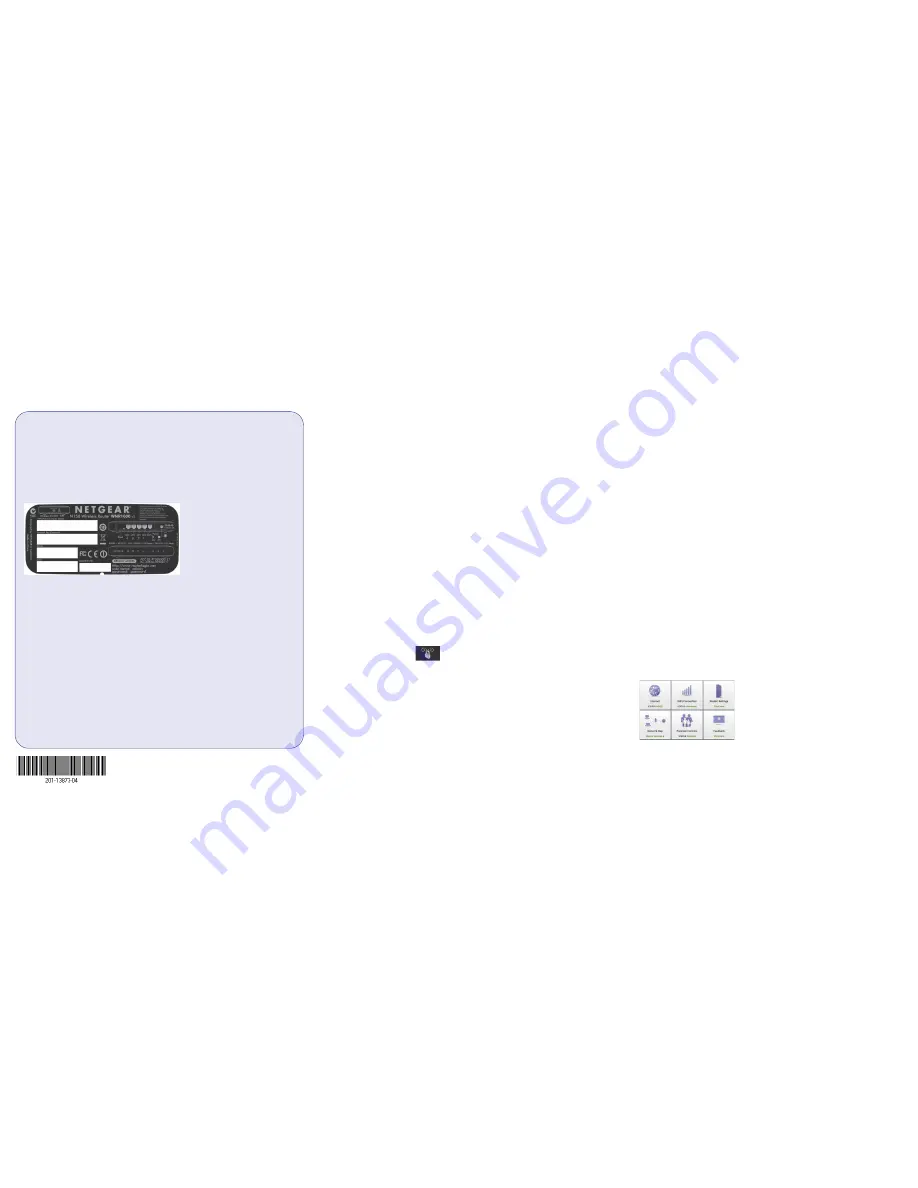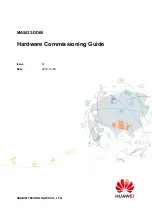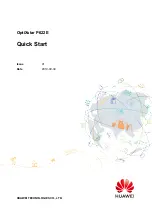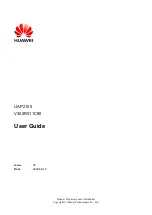
August 2014
NETGEAR, the NETGEAR logo, and Connect with Innovation are trademarks and/or registered trademarks of
NETGEAR, Inc. and/or its subsidiaries in the United States and/or other countries. Information is subject to change
without notice. © NETGEAR, Inc. All rights reserved.
Preset Wireless Security
This product has a unique WiFi network name (SSID) and network key (password).
The default SSID and password are uniquely generated for every device (like a
serial number), to protect and maximize your wireless security. This information is
located on the label on the bottom of the product.
NETGEAR recommends that you do not change the preset SSID or password. If you
do change the settings, the information on the bottom of the product does not apply.
Find the preset wireless settings on your router and record them here:
WiFi network name (SSID) _______________________________
Network key (password) ________________________________
If you change the preset wireless settings, record them here:
Wireless network name (SSID) _______________________________
Network key (password) _____________________________________
If necessary to retrieve or update your password, type
http://www.routerlogin.net
in a web browser and log in using the
default user name (
admin
)
and password (
password
).
Select
Wireless Settings
to locate your wireless password.
Connect Wireless Devices to Your Router
Choose either the manual or WiFi Protected Setup (WPS) method to add
wireless computers, and other devices to your wireless network.
Manual Method
1.
Open the software utility that manages your wireless connections on the
wireless device that you want to connect to your router (iPhone, laptop,
computer, gaming device). This utility scans for all wireless networks in your
area.
2.
Look for the preset NETGEAR wireless network name (SSID), and select it.
The SSID is located on the product label on the bottom of the router.
Note:
If you changed the name of your network during the setup process,
look for that network name.
3.
Enter the preset password (or your custom password if you changed it), and
click
Connect
.
4.
Repeat steps 1–3 to add other wireless devices.
WPS Method
If your wireless device supports WPS (WiFi Protected Setup)—NETGEAR calls
this method Push 'N' Connect—you might be prompted to press the WPS button
on the router instead of entering a password. If this happens:
1.
Press the
WPS
button
on the router.
2.
Within 2 minutes, press the
WPS
button on the client device, or follow the
WPS instructions that came with your wireless device to complete the WPS
process. The device will then be connected to your router.
3.
Repeat this process to add other WPS wireless devices.
Note:
WPS does not support WEP security. If you try to connect a WEP client
to your network using WPS, it will not work.
Troubleshooting
The browser cannot display the web page.
•
Make sure that the computer is connected to one of the four LAN Ethernet ports,
or wirelessly to the router.
•
Make sure that the Wireless LED it lit.
•
Close and reopen the browser to make sure that the browser does not cache the
previous page.
•
Browse to
http://routerlogin.net
.
•
If the computer is set to a static or fixed IP address (this is uncommon), change it
to obtain an IP address automatically from the router.
NETGEAR recommends that you use only the official NETGEAR support resources.
Support
Thank you for purchasing this NETGEAR product.
After installing your device, locate the serial number on the label of your product and
use it to register your product at
https://my.netgear.com
. You must register your
product before you can use NETGEAR telephone support. NETGEAR recommends
registering your product through the NETGEAR website. For product updates and
web support, visit
http://support.netgear.com
. NETGEAR recommends that you use
only the official NETGEAR support resources.
You can get the user manual online at
http://downloadcenter.netgear.com
or through
a link in the product’s user interface. For the current EU Declaration of Conformity,
visit
http://support.netgear.com/app/answers/detail/a_id/11621/
. For regulatory
compliance information, visit
http://www.netgear.com/about/regulatory/
. See the
regulatory compliance document before connecting the power supply.
Get the genie app.
Download the free genie app from
www.NETGEAR.com/genie
.
Easily share media, files, and printers on
the network from your smartphone, tab-
let, or laptop.




















